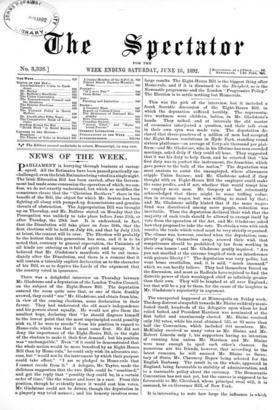There was a delightful interview on Thursday between Mr. Gladstone
and a deputation of the London Trades Council, on the subject of the Eight-Hours Bill. The deputation entered the room quite sure that, as one of them frankly avowed, they could "use " Mr. Gladstone, and obtain from him, in view of the coming elections, some declaration in their favour. They had underrated the old man's independence and his powers about equally. He would not give them the smallest hope, declaring that "he should disgrace himself to the lowest point that the most unprincipled could possibly sink to, if he were to recede" from his position in regard to Home-rule, which was that it must come first. He did not deny the importance of the Eight-Hours Bill, or the right of the electors to make it their first demand ; but his position was "unchangeable." Even "if it could be demonstrated that the whole nation would be more benefited by an Eight-Hours Bill than by Home-rule," he could only wish its advocates suc- cess, but "would not be the instrument by which their purpose could take effect." "I am so pledged to Home-rule that I cannot recede from it." A delegate, Mr. Taylor, made the delicious suggestion that the two Bills could be "combined," and got the reply that "possibly they could be, in a certain order of time," like the winner and loser in a race. From this position, though he evidently knew it would cost him votes, Mr. Gladstone could not be driven, though the deputation in a gingerly way tried menace ; and his honesty involves some
large results. The Eight-Hours Bill is the biggest thing after Home-rule, and if it is dismissed to the Ewigkeit, so is the Newcastle programme and the London "Progressive Policy." The Election is to settle nothing but Home-rule.






































